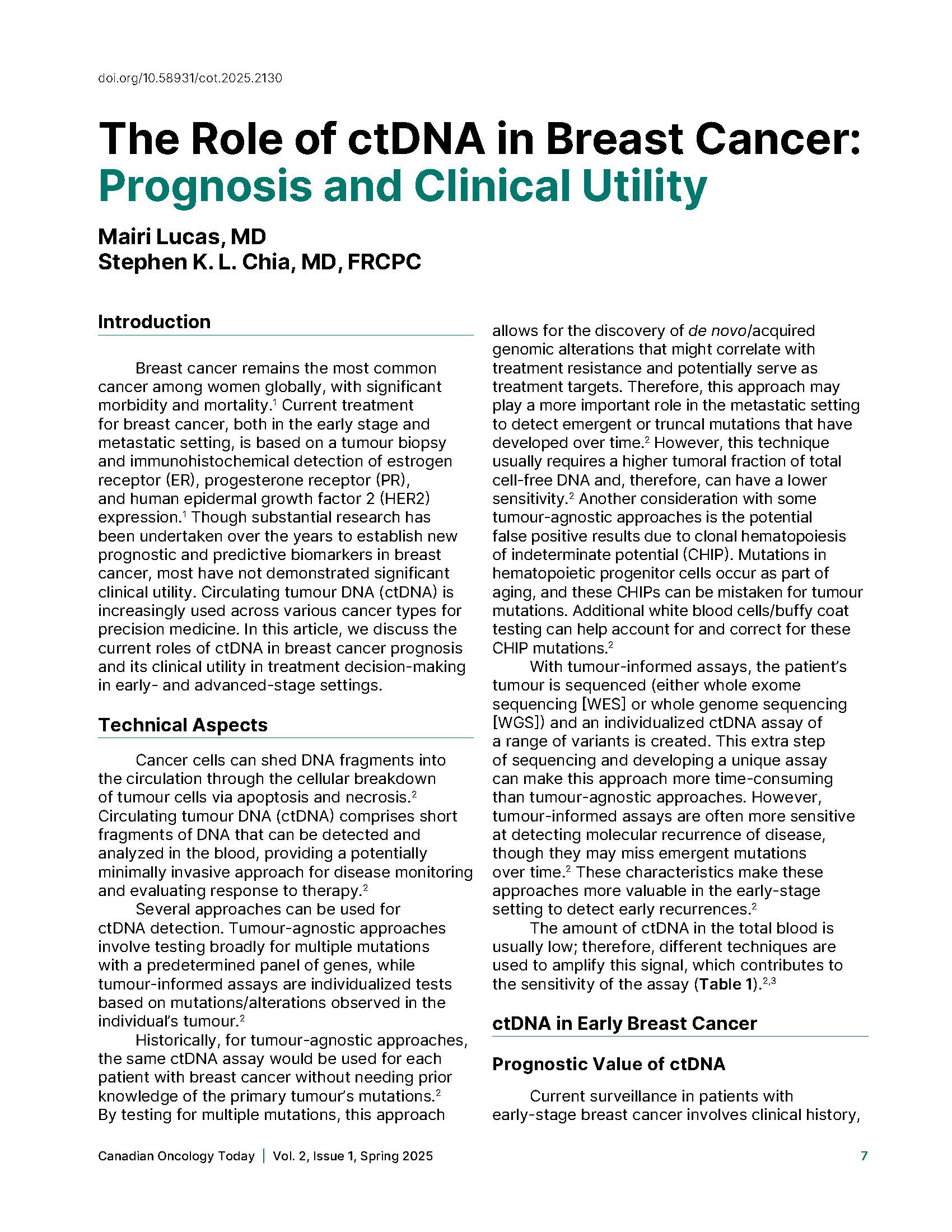The Role of ctDNA in Breast Cancer: Prognosis and Clinical Utility
DOI:
https://doi.org/10.58931/cot.2025.2130Abstract
Breast cancer remains the most common cancer among women globally, with significant morbidity and mortality. Current treatment for breast cancer, both in the early stage and metastatic setting, is based on a tumour biopsy and immunohistochemical detection of estrogen receptor (ER), progesterone receptor (PR), and human epidermal growth factor 2 (HER2) expression. Though substantial research has been undertaken over the years to establish new prognostic and predictive biomarkers in breast cancer, most have not demonstrated significant clinical utility. Circulating tumour DNA (ctDNA) is increasingly used across various cancer types for precision medicine. In this article, we discuss the current roles of ctDNA in breast cancer prognosis and its clinical utility in treatment decision-making in early- and advanced-stage settings.
References
Loibl S, André F, Bachelot T, Barrios CH, Bergh J, Burstein HJ, et al. Early breast cancer: ESMO Clinical Practice Guideline for diagnosis, treatment and follow-up. Ann Oncol. 2024;35(2):159-82.
Panet F, Papakonstantinou A, Borrell M, Vivancos J, Vivancos A, Oliveira M. Use of ctDNA in early breast cancer: analytical validity and clinical potential. NPJ Breast Cancer. 2024;10(1):50.
Moding EJ, Nabet BY, Alizadeh AA, Diehn M. Detecting Liquid Remnants of Solid Tumors: Circulating Tumor DNA Minimal Residual Disease. Cancer Discov. 2021;11(12):2968-86.
Garcia-Murillas I, Chopra N, Comino-Méndez I, Beaney M, Tovey H, Cutts RJ, et al. Assessment of Molecular Relapse Detection in Early-Stage Breast Cancer. JAMA Oncol. 2019;5(10):1473-8.
Coombes RC, Page K, Salari R, Hastings RK, Armstrong A, Ahmed S, et al. Personalized Detection of Circulating Tumor DNA Antedates Breast Cancer Metastatic Recurrence. Clin Cancer Res. 2019;25(14):4255-63.
Radovich M, Jiang G, Hancock BA, Chitambar C, Nanda R, Falkson C, et al. Association of Circulating Tumor DNA and Circulating Tumor Cells After Neoadjuvant Chemotherapy With Disease Recurrence in Patients With Triple-Negative Breast Cancer: Preplanned Secondary Analysis of the BRE12-158 Randomized Clinical Trial. JAMA Oncol. 2020;6(9):1410-5.
Magbanua MJM, Swigart LB, Wu HT, Hirst GL, Yau C, Wolf DM, et al. Circulating tumor DNA in neoadjuvant-treated breast cancer reflects response and survival. Ann Oncol. 2021;32(2):229-39.
Stecklein SR, Kimler BF, Yoder R, Schwensen K, Staley JM, Khan QJ, et al. ctDNA and residual cancer burden are prognostic in triple-negative breast cancer patients with residual disease. NPJ Breast Cancer. 2023;9(1):10.
Loi S, Johnston SRD, Arteaga CL, Graff SL, Chandarlapaty S, Goetz MP, et al. Prognostic utility of ctDNA detection in the monarchE trial of adjuvant abemaciclib plus endocrine therapy (ET) in HR+, HER2-, node-positive, high-risk early breast cancer (EBC). J Clin Oncol. 2024;42(17_suppl):LBA507-LBA.
Sherene Loi SRDJ, Carlos L. Arteaga, Stephanie L. Graff, Sarat Chandarlapaty, Matthew P. Goetz, Christine Desmedt, Hironobu Sasano, Deli Liu, Vanessa Rodrik-Outmezguine, Anthony Sireci, Cynthia Sandoval, Helen H Won, Lacey M Litchfield, Nicholas C. Turner, editor Prognostic utility of ctDNA detection in the monarchE trial of adjuvant abemaciclib plus endocrine therapy (ET) in HR+, HER2-, node-positive, high-risk early breast cancer (EBC). ASCO; 2024; Chicago, USA.
Pusztai L, Kalashnikova E, Hobbs E, Brown-Glaberman U, Mita M, Klein P, et al. Abstract PS06-02: Circulating tumor DNA (ctDNA) monitoring of estrogen receptor-positive, human epidermal growth factor receptor 2-negative (ER+/HER2-) high risk breast cancer during adjuvant endocrine therapy. Cancer Res. 2024;84:PS06-2.
Turner NC, Swift C, Jenkins B, Kilburn L, Coakley M, Beaney M, et al. Results of the c-TRAK TN trial: a clinical trial utilising ctDNA mutation tracking to detect molecular residual disease and trigger intervention in patients with moderate- and high-risk early-stage triple-negative breast cancer. Ann Oncol. 2023;34(2):200-11.
Turner N, Cescon D, Loibl S, Janni W, Rugo H, Balmaña J, et al. Abstract OT2-24-02: ZEST: Randomized phase III study evaluating efficacy and safety of niraparib in patients with HER2-negative BRCA-mutated or triple-negative breast cancer with detectable circulating tumor DNA after definitive therapy. Cancer Res. 2022;82:OT2-24.
Turner N. Circulating tumor DNA surveillance in ZEST, a randomized, phase 3, double-blind study of niraparib or placebo in patients w/ triple-negative breast cancer or HER2+ BRCA-mutated breast cancer with molecular residual disease after definitive therapy. SABC; San Antonio Texas 2024.
Sant M, Bernat-Peguera A, Felip E, Margelí M. Role of ctDNA in Breast Cancer. Cancers (Basel). 2022;14(2).
Dickinson K, Sharma A, Agnihotram R-KV, Altuntur S, Park M, Meterissian S, et al. Circulating Tumor DNA and Survival in Metastatic Breast Cancer: A Systematic Review and Meta-Analysis. JAMA Netw Open. 2024;7(9):e2431722-e.
Wongchenko MJ, Kim SB, Saura C, Oliveira M, Lipson D, Kennedy M, et al. Circulating Tumor DNA and Biomarker Analyses From the LOTUS Randomized Trial of First-Line Ipatasertib and Paclitaxel for Metastatic Triple-Negative Breast Cancer. JCO Precis Oncol. 2020;4:1012-24.
Smerage JB, Barlow WE, Hortobagyi GN, Winer EP, Leyland-Jones B, Srkalovic G, et al. Circulating tumor cells and response to chemotherapy in metastatic breast cancer: SWOG S0500. J Clin Oncol. 2014;32(31):3483-9.
Appierto V, Di Cosimo S, Reduzzi C, Pala V, Cappelletti V, Daidone MG. How to study and overcome tumor heterogeneity with circulating biomarkers: The breast cancer case. Semin Cancer Biol. 2017;44:106-16.
Turner NC, Kingston B, Kilburn LS, Kernaghan S, Wardley AM, Macpherson IR, et al. Circulating tumour DNA analysis to direct therapy in advanced breast cancer (plasmaMATCH): a multicentre, multicohort, phase 2a, platform trial. Lancet Oncol. 2020;21(10):1296-308.
Jhaveri KL, Accordino MK, Bedard PL, Cervantes A, Gambardella V, Hamilton E, et al. Phase I/Ib Trial of Inavolisib Plus Palbociclib and Endocrine Therapy for PIK3CA-Mutated, Hormone Receptor-Positive, Human Epidermal Growth Factor Receptor 2-Negative Advanced or Metastatic Breast Cancer. J Clin Oncol. 2024;42(33):3947-56.

Published
How to Cite
Issue
Section
License
Copyright (c) 2025 Canadian Oncology Today

This work is licensed under a Creative Commons Attribution-NonCommercial-NoDerivatives 4.0 International License.
